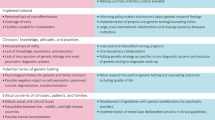Abstract
At present we stand at a way station of genetic knowledge about mental disorders. We have, or soon will have, presymptomatic and prenatal tests, but no treatments. The goal of research should be treatment. Meanwhile, we are left with diagnoses. “Way station technology” is not unique in the history of medicine; diagnoses without treatments characterized most medical practice before the twentieth century. What is unique in modern genetics is the capacity to diagnose disorders many years — perhaps almost a lifetime — before onset, without being able to prevent the inevitable. This situation poses difficult ethical problems, including the following:
-
a)
should presymptomatic tests be offered in the absence of treatment, and if so, to whom?
-
b)
should children be tested if parents request it?
-
c)
should a fetus be tested if parents do not want to know their own genetic status?
-
d)
should spouses, family members at genetic risk, employers, or insurers have access to test results?
-
e)
who should have access to, or ownership of, DNA samples?
Access this chapter
Tax calculation will be finalised at checkout
Purchases are for personal use only
Preview
Unable to display preview. Download preview PDF.
Similar content being viewed by others
References
Andrews LB (1987) Medical genetics: a legal frontier. American Bar Foundation, Chicago
Bird SJ (1985) Presymptomatic testing for Huntington’s disease. JAMA 253 (22):3286–3291
Craufurd D, Harris R (1986) Ethics of predictive testing for Huntington’s chorea: the need for more information. Br Med J 293:249–251
Farrer LA, Myers RH, Cupples LA, Conneally PM (1988) Considerations in using linkage analysis as a presymptomatic test for Huntington’s disease. J Med Genet 25:577–588
Kahneman D, Tversky A (1982) The psychology of preference. Sci Am 246:160–171
Kessler S (1987) The dilemma of suicide and Huntington’s disease. Am J Med Genet 26:315–317
Kessler S, Field T, Worth L, Mosbarger H (1987) Attitudes of persons at risk for Huntington’s disease toward predictive testing. Am J Med Genet 26:259–270
Lamport AT (1987) Presymptomatic testing for Huntington’s chorea: ethical and legal issues. Am J Med Genet 26:307–314
Lifton RJ (1967) Death in life: survivors of Hiroshima. Random House, New York
Markel DS, Young AB, Penney JB (1987) At-risk persons’ attitudes toward presymptomatic and prenatal testing of Huntington’s disease in Michigan. Am J Med Genet 26:295–305
Mastromauro C, Myers RH, Berkman B (1987) Attitudes toward presymptomatic testing in Huntington’s disease. Am J Med Genet 26:271–282
Meissen GJ, Berchek RL (1987) Intended use of predictive testing by those at risk for Huntington’s disease. Am J Med Genet 26:283–293
Meissen GJ, Myers RH, Mastromauro CA, Koroshetz WJ, Klinger KW, Farrer LA, Watkins PA, Gusella JF, Bird ED, Martin JB (1988) Predictive testing for Huntington’s disease with use of a linked DNA marker. N Engl J Med 318:535–542
Murray TH (1983) Warning: screening workers for genetic risk. Hastings Center Rep 13:5–8
Nolan K, Swenson S (1988) New tools, new dilemmas: genetic frontiers. Hastings Center Rep Oct/Nov:40–46
President’s Commission for the Study of Ethical Problems in Medicine and Biomedical and Behavioral Research (1983) Screening and counseling for genetic conditions. US Government Printing Office, Washington
Sartorius N (1988) Cross-cultural and international collaboration in mental health research and action: experience from the mental health programme of the World Health Organization. Acta Psychiatr Scand 78 [344, Suppl]:71–74
Shaw MW (1987) Testing for the Huntington gene: a right to know, a right not to know, or a duty to know. Am J Med Genet 26:243–246
Smurl JF, Weaver DD (1987) Presymptomatic testing for Huntington’s chorea: guidelines for moral and social accountability. Am J Med Genet 26:247–257
Sorenson JR, Wertz DC (1986) Couple agreement before and after genetic counseling. Am J Med Genet 25:549–555
Wertz DC, Fletcher JC (1989a) Ethics and human genetics: a cross-cultural perspective. Springer, Berlin Heidelberg New York
Wertz DC, Fletcher JC (1989b) An international survey of attitudes of medical geneticists toward mass screening and access to results. Public Health Rep 104(1):35–44
Wertz DC, Sorenson JR, Heeren TC (1984) Genetic counseling and reproductive uncertainty. Am J Med Genet 18:79–88
Wertz DC, Sorenson JR, Heeren TC (1986) Clients’ interpretations of risks provided in genetic counseling. Am J Hum Genet 39:253–264
Wertz DC, Sorenson JR, Heeren TC (1988) Communication in health professional-lay encounters: how often does each party know what the other wants to discuss? In: Ruben BD (ed) Information and behavior 2. Transaction Books, New Brunswick NJ, pp 329–342
Wexler NS (1989) The oracle of DNA. In: Rowland LP, Wood DS, Schon EA, DiMauro S (eds) Molecular genetics in diseases of brain, nerve, and muscle. Oxford University Press, New York, pp 429–442
Editor information
Editors and Affiliations
Rights and permissions
Copyright information
© 1990 Springer-Verlag Berlin Heidelberg
About this paper
Cite this paper
Wertz, D.C. (1990). Ethical Issues in the Application of Knowledge from Molecular Genetics to Mental Disorders. In: Bulyzhenkov, V., Christen, Y., Prilipko, L. (eds) Genetic Approaches in the Prevention of Mental Disorders. Springer, Berlin, Heidelberg. https://doi.org/10.1007/978-3-662-07421-3_11
Download citation
DOI: https://doi.org/10.1007/978-3-662-07421-3_11
Publisher Name: Springer, Berlin, Heidelberg
Print ISBN: 978-3-662-07423-7
Online ISBN: 978-3-662-07421-3
eBook Packages: Springer Book Archive




